Review| Bad Times at the El Royale
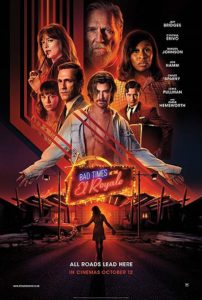 I specifically recall my eyes widening upon first watch of the trailer for Bad Times at the El Royale earlier this year. It immediately became a must see for me. Striking cinematography, a haunting soundtrack, the weight of actors Jeff Bridges, Jon Hamm and Chris Hemsworth at the helm of a single location mystery. What’s not to love? Most of what drew me to the theaters delivered sufficiently and proved to be the strongest points of a film that continually ramped up the stakes, yet managed to stumble through its finale.
I specifically recall my eyes widening upon first watch of the trailer for Bad Times at the El Royale earlier this year. It immediately became a must see for me. Striking cinematography, a haunting soundtrack, the weight of actors Jeff Bridges, Jon Hamm and Chris Hemsworth at the helm of a single location mystery. What’s not to love? Most of what drew me to the theaters delivered sufficiently and proved to be the strongest points of a film that continually ramped up the stakes, yet managed to stumble through its finale.
When it’s strong, it’s quite strong. Jeff Bridges, in particular, is given a beautifully layered character to play with. Watching him step through various emotional and mental progressions as Father Daniel Flynn was a thing to behold. Flynn suffers from Alzheimer’s, and regardless of which side of himself he wishes to show the other guests of the El Royale, this fact remains consistent. His backstory is one of crime, but also of tragedy that motivates a desire for completion in his life that is eroding away before his eyes. The interplay between he and Darlene Sweet (Cynthia Erivo) is tender and careful to begin with, and by the end becomes the backbone of trust and a grasping at honor. The terrific singing talents of Erivo as heard either through walls, hidden mics, or raw and in person set the tone for the intersection of a multitude of tragic stories, not just Flynn’s.
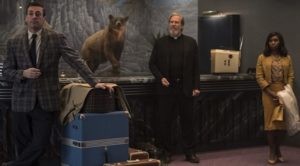 This film is best summarized as such; an intersection of tragedies. Only none of these tragedies are as they appear. Either through intentional deceit or misguided assumptions, every character is hiding something from the others. And each character has their reasons for such deception; whether in service their master, in service to their own desires, or in service to others. If the ‘why’ of all crimes can be boiled down to greed, lust, or power, Bad Times showcases how the ‘who’ can be boiled down to serving out of compulsion, self-indulgence, or charity. Interestingly, despite crimes committed all around, we find a natural empathy towards those serving out of charity, and even for those serving out of compulsion in some cases. A breaking of the law can be seen as a noble means if the ends are kind and charitable to others. Such deception from our characters is set against a historical period in which trust in government officials was trending drastically downward largely due to the Vietnam War. Clips of the conflict, President Nixon speaking of it, and news reports of local violent crimes of passion are interspersed in the film, I believe, to anchor the decisions of our characters in a time when it seems nobody could be trusted and everyone needed to have their guard up.
This film is best summarized as such; an intersection of tragedies. Only none of these tragedies are as they appear. Either through intentional deceit or misguided assumptions, every character is hiding something from the others. And each character has their reasons for such deception; whether in service their master, in service to their own desires, or in service to others. If the ‘why’ of all crimes can be boiled down to greed, lust, or power, Bad Times showcases how the ‘who’ can be boiled down to serving out of compulsion, self-indulgence, or charity. Interestingly, despite crimes committed all around, we find a natural empathy towards those serving out of charity, and even for those serving out of compulsion in some cases. A breaking of the law can be seen as a noble means if the ends are kind and charitable to others. Such deception from our characters is set against a historical period in which trust in government officials was trending drastically downward largely due to the Vietnam War. Clips of the conflict, President Nixon speaking of it, and news reports of local violent crimes of passion are interspersed in the film, I believe, to anchor the decisions of our characters in a time when it seems nobody could be trusted and everyone needed to have their guard up.
If the trailer didn’t strike you as compelling as it did to me, the opening scene is sure to do so. Set ten years prior to the current events, it quickly becomes clear that the El Royale holds many secrets. This hotel, which once served the glitz and glam of society, was now in the early stages of disrepair and mismanagement. The El Royale sits evenly on the border between Nevada and California, drawing conveniently from the legalities of each respective state. Half the guests have reason to be at this hotel specifically, the others find themselves there by necessity or happenstance. Each character at first appears disconnected from the others except for the fact that they’re all staying in the same state border-straddling hotel. The reveal of various backstories and motivations serve as a continual falling of the dominoes that lead to what feels like an inevitable conclusion to it all, where we must take the good with the bad at the El Royale.
 Each character is framed as a function of the room in which they are staying. These quasi-chapter breaks are almost Tarantino-like in the way they delineate the story and give the viewer a full picture for how each part plays into the whole. Thankfully, the rooms prove crucial to the plot and catapult our characters to interactions with one another. In those interactions we see the depths of human lust and greed, but also the heights of forgiveness and charity. In particular, forgiveness is sought from a character that mostly operates in the background of our primary stories but ends up serving a pivotal role as he is given a chance at restitution for something he views as a mortal sin in his life. Many viewers may have to simply adapt this characters outlook of his own actions in order to “buy in” to his motivations in the finale. It’s certainly a gray enough area to be underwhelmed at the reveal, especially after its buildup. Be that as it may, it provides an answer of sorts to the catastrophe of this intersection of tragedies, while maintaining the general theme that secrets kept can be dangerous for all parties involved.
Each character is framed as a function of the room in which they are staying. These quasi-chapter breaks are almost Tarantino-like in the way they delineate the story and give the viewer a full picture for how each part plays into the whole. Thankfully, the rooms prove crucial to the plot and catapult our characters to interactions with one another. In those interactions we see the depths of human lust and greed, but also the heights of forgiveness and charity. In particular, forgiveness is sought from a character that mostly operates in the background of our primary stories but ends up serving a pivotal role as he is given a chance at restitution for something he views as a mortal sin in his life. Many viewers may have to simply adapt this characters outlook of his own actions in order to “buy in” to his motivations in the finale. It’s certainly a gray enough area to be underwhelmed at the reveal, especially after its buildup. Be that as it may, it provides an answer of sorts to the catastrophe of this intersection of tragedies, while maintaining the general theme that secrets kept can be dangerous for all parties involved.
Bad Times at the El Royale never ceases to drive the audience forward into the mystery and intrigue. While I do find fault with the motivations of one character, and another feels like a complete MacGuffin, the strengths of the other performance and the crafting together of all the stories outweigh those critiques and make this a rather enjoyable mystery thriller.


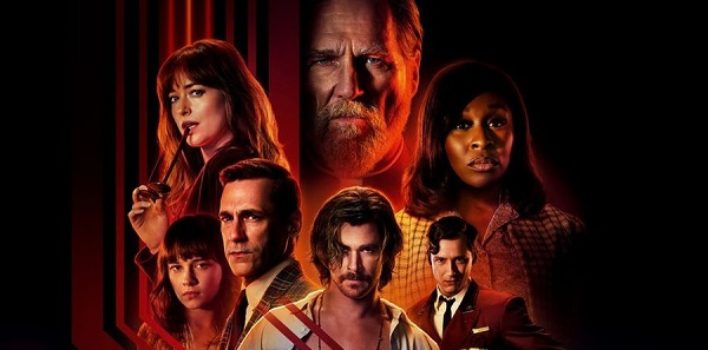

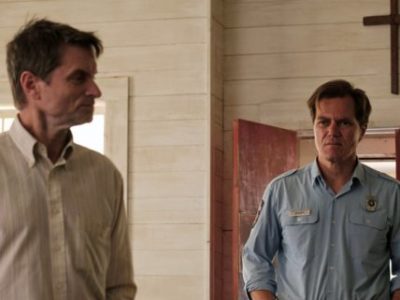
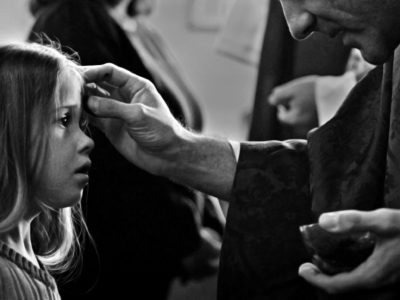



Pingback: #188 – Bad Times at the El Royale and the Necessity of Confession | Reel World Theology